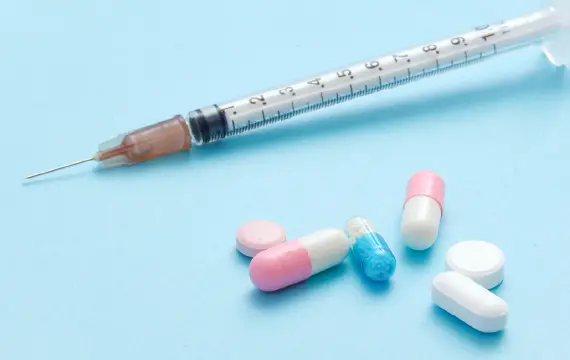There are various diseases in the world, and many patients are waiting for new drugs to treat them. No matter how great a "new drug candidate" is found, it is not immediately available for therapeutic use. The appropriate dosage and administration method should be carefully investigated, as well as the extent to which side effects may appear. The final stage of testing to investigate the efficacy (effectiveness) and safety (side effects) of such new drug candidates is the clinical trial. Clinical trials are conducted with the cooperation of healthy people and patients, and the results of the trials are submitted to the regulatory agencies, such as the Ministry of Health, Labor and Welfare in Japan, and only those approved are supplied to patients as "new drugs.
approximately
700
*Number of applications in Apr-Mar 2024
approximately
3 to 7years
2848
*Number of sites applied in Apr-Mar 2024
Clinical trials are conducted in accordance with the rules of Good Clinical Practice (GCP), a ministerial ordinance on standards for the conduct of clinical trials of pharmaceuticals established by the government. GCP provides various rules to accurately investigate the efficacy and safety of "new drug candidates" in a scientific manner, while protecting the human rights and ensuring the safety of those participating in clinical trials. Therefore, clinical trials are only conducted at medical institutions that meet the requirements set forth in the GCP.
The requirements for medical institutions vary. For example, the medical institution must have sufficient medical facilities and the medical staff necessary to properly and smoothly conduct a clinical trial, such as physicians, nurses, and pharmacists.
by an investigational review board (IRB)* in advance. The Clinical Trial Review Committee examines whether the "clinical trial plan" is designed to protect the human rights and welfare of patients participating in the clinical trial and to scientifically investigate the effects of the "drug candidate," whether the medical institutions and physicians who will conduct the clinical trial are qualified, and whether the details of the clinical trial are to be properly explained to the patients who will participate in the trial. Medical institutions must obtain approval from the Institutional Review Board before they can start a clinical trial.
*Investigational Review Boards (IRBs) always include people who have no vested interest in the medical institution, as well as patients and citizens who are not medical professionals. Investigational Review Board conducts its review independently from the physicians and pharmaceutical companies conducting the clinical trial.
A new drug is delivered to patients after many stringent studies and reviews, involving many people.
Here is the process of finding a drug candidate and getting it to you.

The first step in the development of a new drug begins with the discovery of a substance (compound) that has the potential to become a new drug. Using various methods such as extraction from natural materials or chemical synthesis, we select "new drug candidates" by accumulating basic research.

In the next step, the efficacy and safety of the selected "new drug candidates" are checked through tests using animals and cultured cells to see if they demonstrate the expected effects and if there are any side effect problems.

A "new drug candidate" is called an "investigational new drug" and a "clinical trial" is a type of "clinical study" conducted to determine if it is effective and safe for humans. Clinical trials are conducted in three phases, from Phase I to Phase III, in sequence while confirming efficacy and safety.

After confirming the efficacy, safety, quality, and proper use of the "investigational new drug" through clinical trials, pharmaceutical companies submit an application to the regulatory agencies, such as the Ministry of Health, Labour and Welfare in Japan to manufacture and market the drug as a new drug. After the application is submitted, it is subject to rigorous review by the Pharmaceuticals and Medical Devices Agency (PMDA) and other agencies.

With the approval of the regulatory agency, such as the Ministry of Health, Labor and Welfare in Japan, a "new medicine" is finally born. It takes 3 to 7 years to launch one drug. Even after a new drug is launched, research and trials continue to improve the drug to make it even safer and easier to use.
Clinical trials are conducted in three phase to confirm efficacy and safety.
A small number of healthy adults are administered very small doses of the investigational drug to confirm its safety. It also examines how fast the study drug is absorbed into the body, how long it takes, and how it is eliminated from the body.
The study will determine if the investigational drug can treat the desired disease or condition. The study is conducted on a small number of patients to investigate the efficacy, safety, dosage (how the drug is administered: frequency, duration, and interval of administration), and dosage (the most effective dose) of the investigational drug.
This is the final stage of the clinical trial. To test the drug in a manner similar to actual treatment, the investigational drug is administered to a large number of patients. The efficacy and safety of the drug will be compared to currently used standard drugs or placebos (dummy drugs).